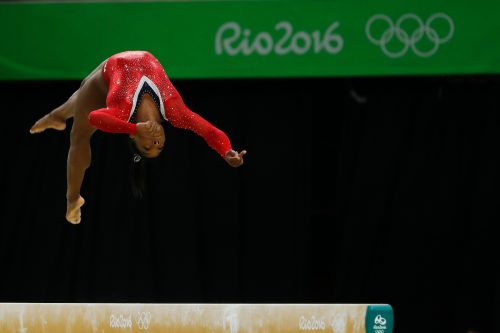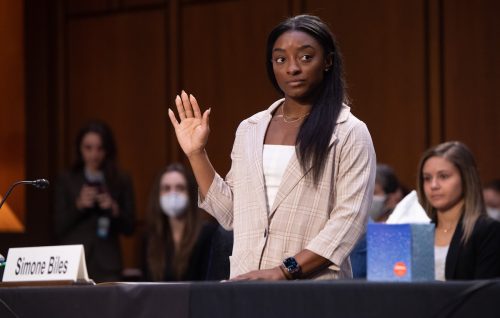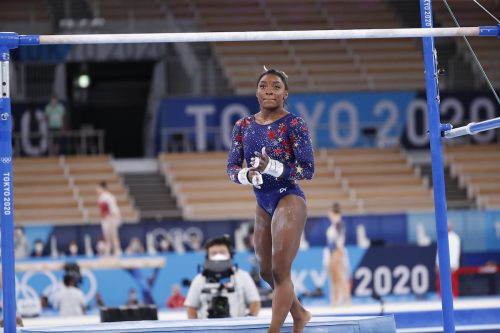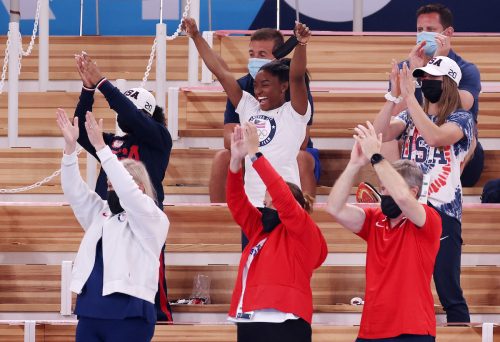Simone Biles Reveals Why She “Should Have Quit” Before Tokyo Olympics

The most shocking news to come out of this year’s Tokyo Olympics was Simone Biles dropping out of most of the gymnastics competitions. After all, in her second Olympics, the woman widely considered to be the greatest gymnast of all time was expected to add even more gold medals to her collection. But, after suffering from “the twisties”—which is when a gymnast loses awareness of where they are in the air—Biles made the choice to remove herself from the group all-around competition.
While Biles has explained why she chose to sit out multiple events in Tokyo, in a new interview with New York Magazine‘s The Cut, she goes deeper. The 24-year-old explains why it’s unbelievable that she made it to the games at all given all that she’s gone through. Read on to find out why Biles believes she should have stopped competing years before the Tokyo games.
RELATED: See Mary Lou Retton’s 4 Daughters, Who All Followed in Her Footsteps.
Biles’ body and mind were no longer connecting.

Having the twisties means that a gymnast loses the sense of where they are in the air during a skill. This is very dangerous, because it means that they may not be able to land properly. “It’s basically life or death,” Biles told New York Magazine of the Olympic vault that led her to step back. “It’s a miracle I landed on my feet. If that was any other person, they would have gone out on a stretcher. As soon as I landed that vault, I went and told my coach: ‘I cannot continue.’”
Biles said that she felt more nervous than she usually does heading into the Olympics and that something inside of her felt off. She tried training in a different way, including practicing where she could land on softer surfaces. “Every avenue we tried, my body was like, ‘Simone, chill. Sit down. We’re not doing it,'” she explained. “And I’ve never experienced that.”
The trauma she’s endured as a sexual assault survivor has impacted her.

In 2018, Biles shared publicly that, like many other gymnasts, she had been sexually assaulted by former Team USA doctor Larry Nassar. Nassar has since been convicted to life in prison without parole. Biles is now involved in an investigation into the handling of the abuse by the FBI.
“If you looked at everything I’ve gone through for the past seven years, I should have never made another Olympic team,” Biles told New York Magazine. “I should have quit way before Tokyo, when Larry Nassar was in the media for two years. It was too much. But I was not going to let him take something I’ve worked for since I was six years old. I wasn’t going to let him take that joy away from me. So I pushed past that for as long as my mind and my body would let me.”
She wouldn’t take back her Tokyo experience.

After withdrawing from the team all-around competition, Biles also sat out of the individual all-around, uneven bars, vault, and floor exercise competitions. She did participate in the balance beam event and won a bronze medal.
“It’s like I jumped out of a moving train,” she said in the interview. “Everybody asks, ‘If you could go back, would you?’ No. I wouldn’t change anything because everything happens for a reason. And I learned a lot about myself—courage, resilience, how to say no and speak up for yourself.”
For more celebrity news delivered right to your inbox, sign up for our daily newsletter.
She got to experience the sport and being on her team in a different way.

While Biles doesn’t regret her decision, she does still struggle with it. “Sometimes it’s like, yeah, I’m perfectly okay with it. Like, that’s how it works. That’s how it panned out,” she said. “And then other times I’ll just start bawling in the house.”
But taking part in the Olympics in a different way helped her to see things in a more positive light. Being the top gymnast in the world means that she hadn’t been able to take in many competitions as a viewer. By withdrawing, Biles got to do this for the first time. “I’ve always made the finals. I’ve never sat in the crowd,” she told New York Magazine. “I’ve always wanted to see myself, like have an out-of-body experience, and I feel like God gave that to me. I got to watch the girls and my competitors compete. I was wowed by what they did, like, ‘How are they doing that?’ Like, ‘How amazing is this?’”
RELATED: McKayla Maroney Became an Olympic Icon a Decade Ago. See Her Now.